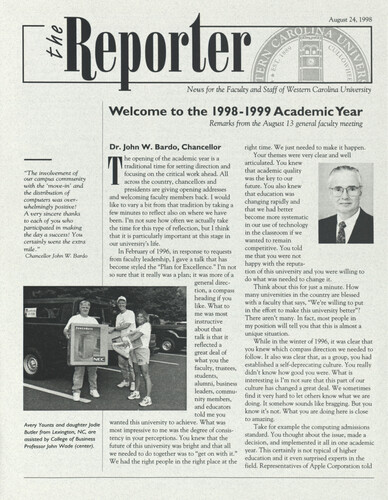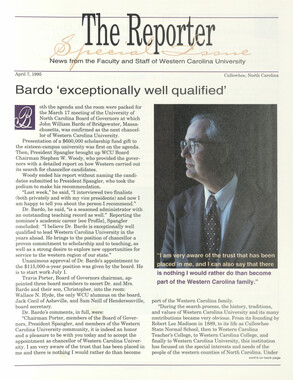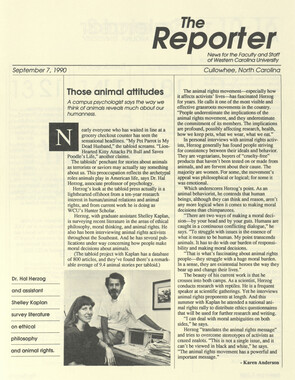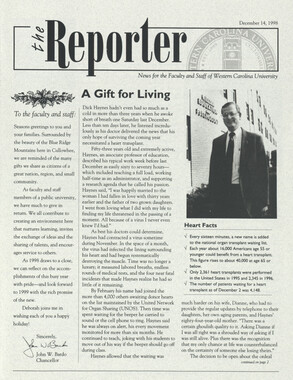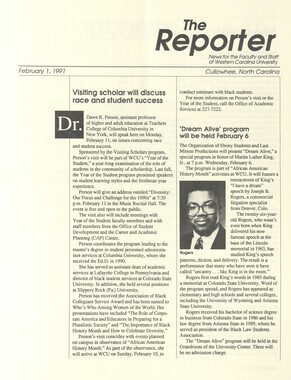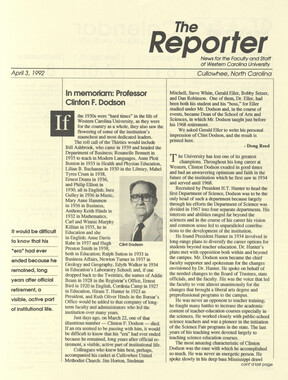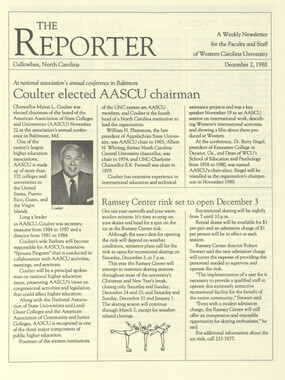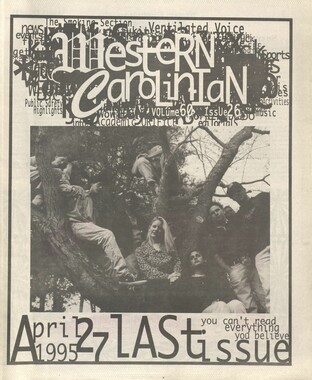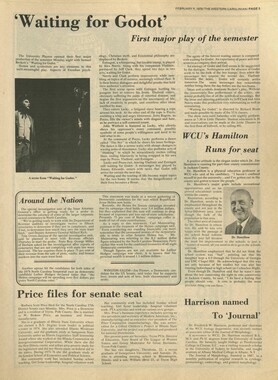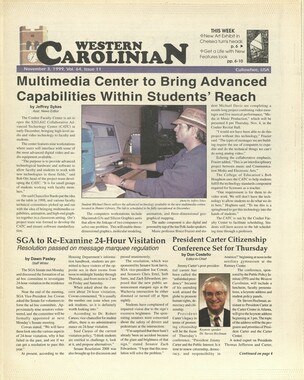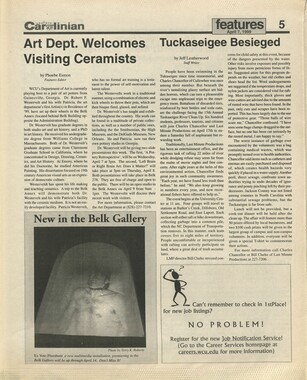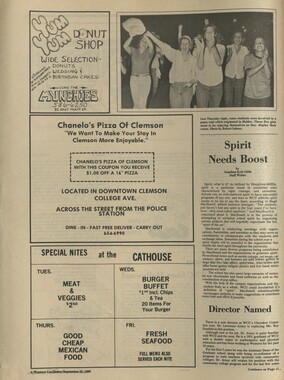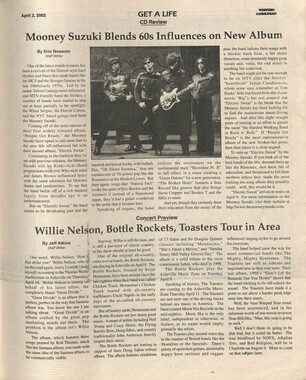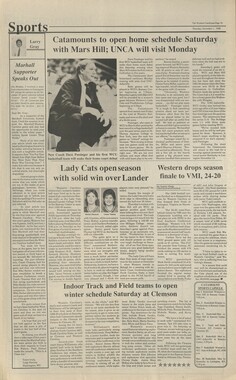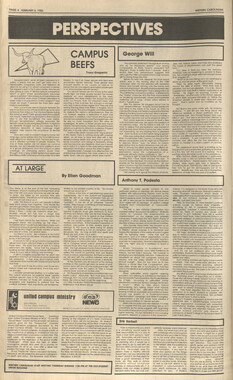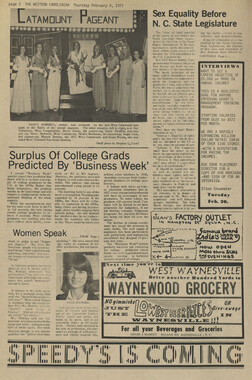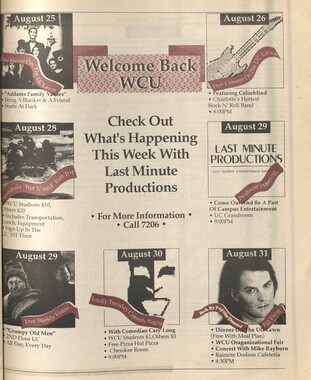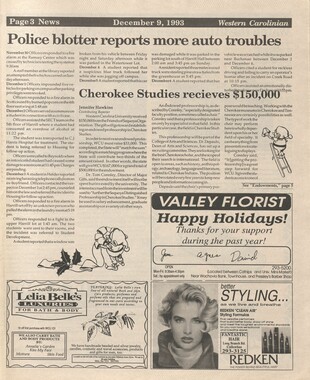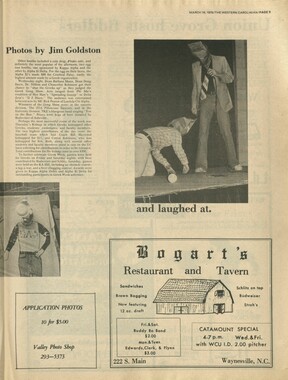Western Carolina University (20)
View all
- Canton Champion Fibre Company (2308)
- Cherokee Traditions (293)
- Civil War in Southern Appalachia (165)
- Craft Revival (1942)
- Great Smoky Mountains - A Park for America (2683)
- Highlights from Western Carolina University (430)
- Horace Kephart (941)
- Journeys Through Jackson (154)
- LGBTQIA+ Archive of Jackson County (15)
- Oral Histories of Western North Carolina (314)
- Picturing Appalachia (6679)
- Stories of Mountain Folk (413)
- Travel Western North Carolina (160)
- Western Carolina University Fine Art Museum Vitreograph Collection (129)
- Western Carolina University Herbarium (92)
- Western Carolina University: Making Memories (708)
- Western Carolina University Publications (2283)
- Western Carolina University Restricted Electronic Theses and Dissertations (146)
- Western North Carolina Regional Maps (71)
- World War II in Southern Appalachia (131)
University of North Carolina Asheville (6)
View all
- Allanstand Cottage Industries (62)
- Appalachian National Park Association (53)
- Bennett, Kelly, 1890-1974 (1295)
- Berry, Walter (76)
- Brasstown Carvers (40)
- Carver, George Washington, 1864?-1943 (26)
- Cathey, Joseph, 1803-1874 (1)
- Champion Fibre Company (233)
- Champion Paper and Fibre Company (297)
- Cherokee Indian Fair Association (16)
- Cherokee Language Program (22)
- Crowe, Amanda (40)
- Edmonston, Thomas Benton, 1842-1907 (7)
- Ensley, A. L. (Abraham Lincoln), 1865-1948 (275)
- Fromer, Irving Rhodes, 1913-1994 (70)
- George Butz (BFS 1907) (46)
- Goodrich, Frances Louisa (120)
- Grant, George Alexander, 1891-1964 (96)
- Heard, Marian Gladys (60)
- Kephart, Calvin, 1883-1969 (15)
- Kephart, Horace, 1862-1931 (313)
- Kephart, Laura, 1862-1954 (39)
- Laney, Gideon Thomas, 1889-1976 (439)
- Masa, George, 1881-1933 (61)
- McElhinney, William Julian, 1896-1953 (44)
- Niggli, Josephina, 1910-1983 (10)
- North Carolina Park Commission (105)
- Osborne, Kezia Stradley (9)
- Owens, Samuel Robert, 1918-1995 (11)
- Penland Weavers and Potters (36)
- Roberts, Vivienne (15)
- Roth, Albert, 1890-1974 (142)
- Schenck, Carl Alwin, 1868-1955 (1)
- Sherrill's Photography Studio (2565)
- Southern Highland Handicraft Guild (127)
- Southern Highlanders, Inc. (71)
- Stalcup, Jesse Bryson (46)
- Stearns, I. K. (213)
- Thompson, James Edward, 1880-1976 (226)
- United States. Indian Arts and Crafts Board (130)
- USFS (683)
- Vance, Zebulon Baird, 1830-1894 (1)
- Weaver, Zebulon, 1872-1948 (58)
- Western Carolina College (230)
- Western Carolina Teachers College (282)
- Western Carolina University (1794)
- Western Carolina University. Mountain Heritage Center (18)
- Whitman, Walt, 1819-1892 (10)
- Wilburn, Hiram Coleman, 1880-1967 (73)
- Williams, Isadora (3)
- Cain, Doreyl Ammons (0)
- Crittenden, Lorraine (0)
- Rhodes, Judy (0)
- Smith, Edward Clark (0)
- Appalachian Region, Southern (2393)
- Asheville (N.C.) (1886)
- Avery County (N.C.) (26)
- Blount County (Tenn.) (147)
- Buncombe County (N.C.) (1664)
- Cherokee County (N.C.) (283)
- Clay County (N.C.) (555)
- Graham County (N.C.) (233)
- Great Smoky Mountains National Park (N.C. and Tenn.) (478)
- Haywood County (N.C.) (3522)
- Henderson County (N.C.) (70)
- Jackson County (N.C.) (4692)
- Knox County (Tenn.) (21)
- Knoxville (Tenn.) (9)
- Lake Santeetlah (N.C.) (10)
- Macon County (N.C.) (420)
- Madison County (N.C.) (211)
- McDowell County (N.C.) (39)
- Mitchell County (N.C.) (132)
- Polk County (N.C.) (35)
- Qualla Boundary (981)
- Rutherford County (N.C.) (76)
- Swain County (N.C.) (2017)
- Transylvania County (N.C.) (247)
- Watauga County (N.C.) (12)
- Waynesville (N.C.) (68)
- Yancey County (N.C.) (72)
- Aerial Photographs (3)
- Aerial Views (60)
- Albums (books) (4)
- Articles (1)
- Artifacts (object Genre) (228)
- Biography (general Genre) (2)
- Cards (information Artifacts) (38)
- Clippings (information Artifacts) (191)
- Crafts (art Genres) (622)
- Depictions (visual Works) (21)
- Design Drawings (1)
- Drawings (visual Works) (184)
- Envelopes (73)
- Facsimiles (reproductions) (1)
- Fiction (general Genre) (4)
- Financial Records (12)
- Fliers (printed Matter) (67)
- Glass Plate Negatives (381)
- Guidebooks (2)
- Internegatives (10)
- Interviews (811)
- Land Surveys (102)
- Letters (correspondence) (1013)
- Manuscripts (documents) (619)
- Maps (documents) (159)
- Memorandums (25)
- Minutes (administrative Records) (59)
- Negatives (photographs) (5651)
- Newsletters (1285)
- Newspapers (2)
- Occupation Currency (1)
- Paintings (visual Works) (1)
- Pen And Ink Drawings (1)
- Periodicals (193)
- Personal Narratives (7)
- Photographs (12982)
- Plans (maps) (1)
- Poetry (5)
- Portraits (1654)
- Postcards (329)
- Programs (documents) (151)
- Publications (documents) (2237)
- Questionnaires (65)
- Scrapbooks (282)
- Sheet Music (1)
- Slides (photographs) (402)
- Sound Recordings (796)
- Specimens (92)
- Speeches (documents) (15)
- Tintypes (photographs) (8)
- Transcripts (322)
- Video Recordings (physical Artifacts) (23)
- Vitreographs (129)
- Text Messages (0)
- A.L. Ensley Collection (275)
- Appalachian Industrial School Records (7)
- Appalachian National Park Association Records (336)
- Axley-Meroney Collection (2)
- Bayard Wootten Photograph Collection (20)
- Bethel Rural Community Organization Collection (7)
- Blumer Collection (5)
- C.W. Slagle Collection (20)
- Canton Area Historical Museum (2110)
- Carlos C. Campbell Collection (198)
- Cataloochee History Project (65)
- Cherokee Studies Collection (4)
- Daisy Dame Photograph Album (5)
- Daniel Boone VI Collection (1)
- Doris Ulmann Photograph Collection (112)
- Elizabeth H. Lasley Collection (1)
- Elizabeth Woolworth Szold Fleharty Collection (4)
- Frank Fry Collection (95)
- George Masa Collection (173)
- Gideon Laney Collection (452)
- Hazel Scarborough Collection (2)
- Hiram C. Wilburn Papers (28)
- Historic Photographs Collection (236)
- Horace Kephart Collection (861)
- Humbard Collection (33)
- Hunter and Weaver Families Collection (1)
- I. D. Blumenthal Collection (4)
- Isadora Williams Collection (4)
- Jesse Bryson Stalcup Collection (47)
- Jim Thompson Collection (224)
- John B. Battle Collection (7)
- John C. Campbell Folk School Records (80)
- John Parris Collection (6)
- Judaculla Rock project (2)
- Kelly Bennett Collection (1314)
- Love Family Papers (11)
- Major Wiley Parris Civil War Letters (3)
- Map Collection (12)
- McFee-Misemer Civil War Letters (34)
- Mountain Heritage Center Collection (4)
- Norburn - Robertson - Thomson Families Collection (44)
- Pauline Hood Collection (7)
- Pre-Guild Collection (2)
- Qualla Arts and Crafts Mutual Collection (12)
- R.A. Romanes Collection (681)
- Rosser H. Taylor Collection (1)
- Samuel Robert Owens Collection (94)
- Sara Madison Collection (144)
- Sherrill Studio Photo Collection (2558)
- Smoky Mountains Hiking Club Collection (616)
- Stories of Mountain Folk - Radio Programs (374)
- The Reporter, Western Carolina University (510)
- Venoy and Elizabeth Reed Collection (16)
- WCU Gender and Sexuality Oral History Project (32)
- WCU Mountain Heritage Center Oral Histories (25)
- WCU Oral History Collection - Mountain People, Mountain Lives (71)
- WCU Students Newspapers Collection (1744)
- Western North Carolina Tomorrow Black Oral History Project (69)
- William Williams Stringfield Collection (2)
- Zebulon Weaver Collection (109)
- African Americans (388)
- Appalachian Trail (32)
- Artisans (521)
- Cherokee art (84)
- Cherokee artists -- North Carolina (10)
- Cherokee language (21)
- Cherokee pottery (101)
- Cherokee women (208)
- Church buildings (166)
- Civilian Conservation Corps (U.S.) (110)
- College student newspapers and periodicals (1830)
- Dams (94)
- Dance (1023)
- Education (222)
- Floods (60)
- Folk music (1015)
- Forced removal, 1813-1903 (2)
- Forest conservation (220)
- Forests and forestry (905)
- Gender nonconformity (4)
- Great Smoky Mountains National Park (N.C. and Tenn.) (154)
- Hunting (38)
- Landscape photography (10)
- Logging (103)
- Maps (84)
- Mines and mineral resources (8)
- North Carolina -- Maps (18)
- Paper industry (38)
- Postcards (255)
- Pottery (135)
- Railroad trains (69)
- Rural electrification -- North Carolina, Western (3)
- School integration -- Southern States (2)
- Segregation -- North Carolina, Western (5)
- Slavery (5)
- Sports (452)
- Storytelling (245)
- Waterfalls -- Great Smoky Mountains (N.C. and Tenn.) (66)
- Weaving -- Appalachian Region, Southern (280)
- Wood-carving -- Appalachian Region, Southern (328)
- World War, 1939-1945 (173)
The Reporter, August 1998
-
The Reporter is a publication produced by Western Carolina University featuring news, events, and campus community updates for faculty and staff. The publication began in August of 1970 and continues digitally today. Click on the link in the “Related Mate
-
-
August 24, 1998 News for the Faculty and Staff of Western Carolina University "The involvement of our campus community with the 'move-in' and the distribution of computers was overwhelmingly positive! A very sincere thanks to each of you who participated in making the day a success! You certainly went the extra mile." Chancellor John XV. B ardo Welcome to the 1998-1999 Academic Year Remarks from the August 13 general faculty meeting Avery Younts and daughter Jodie Butler from Lexington, NC, are assisted by College of Business Professor John Wade (center). Dr. John W. Bardo, Chancellor The opening of the academic year is a traditional time for setting direction and focusing on the critical work ahead. All across the country, chancellors and presidents are giving opening addresses and welcoming faculty members back. I w ould like to vary a bit from that tradition by taking a few minutes to reflect also on where we have been. I'm not sure how often we actually take the time for this type of reflection, but I th ink that it is particularly important at this stage in our university's life. In February of 1996, in response to requests from faculty leadership, I gave a talk that has become styled the "Plan for Excellence." I'm not so sure that it really was a plan; it was more of a general direction, a compass heading if you like. What to me was most instructive about that talk is that it reflected a great deal of what you the faculty, trustees, students, alumni, business leaders, community members, and educators told me you wanted this university to achieve. What was most impressive to me was the degree of consistency in your perceptions. You knew that the future of this university was bright and that all we needed to do together was to "get on with it." We had the right people in the right place at the right time. We just needed to make it happen. Your themes were very clear and well articulated. You knew that academic quality was the key to our future. You also knew that education was changing rapidly and that we had better become more systematic in our use of technology in the classroom if we wanted to remain competitive. You told me that you were not happy with the reputation of this university and you were willing to do what was needed to change it. Think about this for just a minute. How many universities in the country are blessed with a faculty that says, "We're willing to put in the effort to make this university better"? There aren't many. In fact, most people in my position will tell you that this is almost a unique situation. While in the winter of 1996, it was clear that you knew which compass direction we needed to follow. It also was clear that, as a group, you had established a self-deprecating culture. You really didn't know how good you were. What is interesting is I'm not sure that this part of our culture has changed a great deal. We sometimes find it very hard to let others know what we are doing. It somehow sounds like bragging. But you know it's not. What you are doing here is close to amazing. Take for example the computing admissions standard. You thought about the issue, made a decision, and implemented it all in one academic year. This certainly is not typical of higher education and it even surprised experts in the field. Representatives of Apple Corporation told We will try to minimize any negative impacts of short-term enrollment issues as you engage in this most important work of raising academic expectations and the academic reputation of this wonderful university me that they did not believe that this could be done—not by anyone in higher education. This summer they told me that not only had you done it, but that you made it look easy. They also sent General Administration a note in which they reiterated their admiration for what you accomplished. My hat is off to every one of you who helped implement this program, who took training, or who plan to use the computer in teaching and learning this year. This was a world-class accomplishment. You were in the first dozen universities in the United States to implement this requirement. If this were all you accomplished, it would have been a lot. But it was only a beginning. We have talked together about raising academic expectations— the infamous "raising the bar" conversations. Again, you didn't just talk, you acted. Across this campus, academic expectations are increasing. Your students know this is happening, as do our alums. I k now that raising expectations of students can only happen when you are willing to put in the effort. And you are to real effect. There is a down side to increasing academic expectations. In the short-run, it will negatively affect enrollment. Raising standards has created a short-term mismatch between our academic quality and our student recruitment. As a consequence, a very large number of current students did not do the work necessary to meet your expectations. Approximately one in five freshmen, and 6 percent of all undergraduates, failed to meet the academic expectations that you have set. While these are very hard numbers and new admissions cannot make up those kinds of numbers in the short-run, the only option we have as a university is to continue to increase academic expectations. Stay the course; you are doing the right thing both for the university and for our students. We know that the track we are on has to succeed, but it will not do so without some difficulties. We'll work those out together and seek assistance from the General Administration. You have a great deal of support from alumni, General Administration, and the community for what you are doing. We will try to minimize any negative impacts of short-term enrollment issues as you engage in this most important work of raising academic expectations and the academic reputation of this wonderful university. That's the down side, but there is an up side that is tremendously impressive. This year's freshman class is the best academically prepared class in our history. Average SATs going into the fall are 994 (the official SAT will not be calculated until the sixth week of class, so it could change a point or two). This is the first time that we have ever had an average SAT above 990, and it represents a fourteen-point increase over last academic year and a thirty-point increase since 1995. The average high school GPA for our freshmen this year is currently 3.11. In 1995, the average high school GPA was 2.87 and it has increased each year since. The 3.11 is the highest high school grade point average in our history. Just think, we are within striking distance of an average SAT above 1,000 next year, and, if we can stay on track, we could pass some of our sister schools the year after. What an accomplishment. That talk in the winter of 1996 also introduced the notion that we should develop a residential honors college and that we should seek National Merit recognition. Well, many of you have worked on the Honors College and on developing the honors curriculum and it paid off. Last year, we enrolled our first class of freshmen in the college. You may recall that 134 freshmen enrolled who had an average SAT of 1160 and an average high school GPA of 3.94. This year, the honors class has 165 members (that's over 15 percent of all freshmen) with an average SAT of 1182, and the high school GPA is again 3.94. By the way, other universities have been coming to Western to examine our honors college, and the consultants who worked with the university this summer tell me that your work on this program is of such a quality that they plan to export the model. They also pointed out that the retention rate of the Honors College is like that of a "small, elite, private liberal arts college." Those of you who are working with this college have a great deal to be proud of. We are now completing our third year of candidacy for National Merit status. This year we have four National Merit Finalists among this year's freshmen, bringing a total of seventeen on campus. As a result, the admissions office informs me that we have our final year of candidacy next year and that we will be reviewed for recognition during the following academic year. This will be an important recognition for Western. Many of you are working with students in strong mentoring relationships. This is producing a first-rate education. Your work, for instance, in mentoring undergraduate research has moved Western to prominence nationally. WCU was fifteenth in the nation among colleges and universities in the number of papers presented at the National Undergraduate Research Conference this year. And, of course, you recall that two of five undergraduate papers presented at the national meetings sponsored by the Centers for Disease Control and Prevention this summer were by Western students. We're getting attention and it's due to mentoring. You are establishing a pattern of mentoring students that can only be of benefit both to them and the university. Now, let's take the next step. It is time for Western to have a Rhodes or Truman scholar. You've demonstrated that you are willing to mentor good students; let's get you the recognition for your hard work. We have a student who is preparing herself now for the Rhodes competition. Let's help her and identify others who should be trying for these awards. Your personal touch will make a difference. And speaking of personal touches, many of you spent the summer preparing to take part in "learning A u g u s t 2 4 , 1 9 9 8 • T h e R e p o r t e r communities," in modifying our approach to university transition programming, and establishing a program of "learning contracts" for students with academic potential. These initiatives, too, have been hard work but they will make a difference both in terms of the quality of a student's education and the quality of academic life. Both will contribute to the reputation of the university and to retention of academically qualified students. Much of our work this year will need to be focused on retention of academically qualified students. Far too many of our students transfer or simply drop out. I'm not talking about those who choose not to meet your standards. I'm concerned about the ones who should be here. We lose entirely too many of these students. As I mentioned in my summer letter to you, we have taken some very specific actions to improve retention. Many of you have contributed time and knowledge to these efforts over the summer and you deserve a special vote of thanks. We also have hired Alceste Pappas and Associates, arguably the best consulting firm in the nation in this area, to help us rethink admissions and retention. Their suggestions are making a difference. Building on some ideas and preliminary work in admissions, Pappas is helping us move to a "client service" model for admissions. For example, we are asking our admissions counselors to answer the telephone instead of having calls forwarded to them from the secretary. Research on admissions shows that students who telephone for information are more likely to enroll at a university. This puts our most knowledgeable staff in direct contact with students. Further, data show that when potential students are engaged in conversation on their first contacts they are more likely to apply. Pappas also recommended ways of improving our application review process and speeding up notices of decision. These are very different processes for our university, but they have been very effectively applied in other settings. On the retention side, a great deal of work will be done this fall in the CAP Center. The focus of retention services will move to what is known as a "whole student approach." It is akin to "case management" in social work or counseling. Like the changes in admissions, these techniques have been shown to be very effective on other campuses and should immediately help our student retention. Also we are looking to move these services to better quarters. This, too, should make a difference. Retention of academically qualified students is our most pressing problem. And, as Pappas has pointed out, we need to focus and coordinate our efforts much more than we have in the past. To this end, I am asking Dr. Richard Codings and Dr. Robert Caruso to co-chair a retention task force to assure that we coordinate and effectively implement a strong retention program. Because many recommendations of this task force will require approval of the Faculty Senate for implementation, I a m asking Dr. Terry Kinnear to suggest appropriate members of the senate to serve on the task force. Even though we are focusing on systemic issues in retention, this is an area in which your help is greatly needed. No matter what other services the university provides, your relationships with students are critical to their retention. You are the key player in student retention. If you se e a student who needs help or who is failing, let the CAP Center know. We may be able to intervene before that student fails out. Another issue that has emerged from faculty and staff discussions over the summer that I want to heartily endorse involves a rethinking of our orientation program. We do a good job of socially orienting students, but we have not traditionally focused on their academic orientation. You have established very specific academic expectations of students and we need to assure that they understand what you expect of them. One suggestion that has come forward is that entering students should be required to read a specific book over the summer prior to entering the fall semester. During the two-day "jump start" program at the beginning of fall semester, seminars would be held to discuss the book. Ideally, the book should be a topic of discussion in at least one required freshman course during the fall semester. Also, when possible, Freshman Convocation could be changed to have the author of the book become the keynote speaker. This is an interesting idea that could assist students with their academic transition to college life and set the norm early that we are serious about their education. Likewise, faculty and some of our better students have asked that we continue to enhance the quality of the academic culture on the campus. One way in which that can be accomplished is to have significant academic events that set a very visible tone. To this end, starting this fall we will initiate a "Chancellor's Lecture Series." We have invited Mrs. Barbara Bush, former first lady, to speak on issues of reading and education. I e ncourage all of you to assure that your students take part in this program. Those of you in the sciences may have been following the very visible news about the controversy regarding the human genome project. What you may not have known is that this controversy has been caused by a graduate of Western Carolina. Tony White is president and CEO of Perkins-Elmer Corporation, which has created an alternative genome research project. Tony has agreed to help sponsor a one-day symposium on the human genome at WCU this fall. He also has confirmed that Dr. Craig Venter is willing to keynote the symposium. Our audience will be the research scientists in North Carolina and surrounding states. But we need to assure that all our science students have the opportunity to participate. These very public programs can affect the tone of the campus and off-campus perceptions, but the real, You are establishing a pattern of mentoring students that can only be of benefit both to them and the university. No<w, let's take the next step. It is ti me for Western to have a Rhodes or Truman scholar.... Your personal touch will make a difference. T h e R e p o r t e r • A u g u s t 2 4 , 1 9 9 8 There has b een a great deal of progress—and no little discussion—regarding the shape and direction of general education. Please participate in that discussion. Every student in this university must have the benefit of a well-designed and well-executed general education program. day-today work of the university is what makes a difference to the student and her or his willingness to stay at Western. Many, many faculty members have worked on USI 130, developing learning communities, mentoring students, and advising. This is absolutely critical work and it is fundamental to our development. Yet many faculty also tell me that this work is under-rewarded and not fully recognized in the annual faculty evaluation, merit, or tenure and promotion processes. We need to fix that. This year, I am asking Dr. Kinnear on behalf of the Faculty Senate and Vice Chancellor Collings to address these issues. We need to reward faculty members who are willing to do this work well. This is a crucial component of the development process for this university. This is not a situation that is unique to Western or to universities in our mission class. High-quality teaching and learning in a supportive environment is what will define the successful university nationally over the next decade. Even some well-known research universities—Cornell comes immediately to mind—are changing the importance of teaching in tenure and promotion reviews. This is the life's blood of all universities and we need to assure that we are rewarding our colleagues who are willing to bear the brunt of the work. Another crucial question that we need to address this academic year involves undergraduate program review. As I stated in my closing remarks at the end of the last academic year, program review is not really something that any of us look forward to; it is simply the next step in the process of assuring that we can meet the challenges that are ahead of us. Some of you will recall that we had Dr. Robert Shirley, the author of the form of strategic planning that we are using at Western, come to campus to act as an outside reviewer of our plans. Dr. Shirley was generally glowing in his review, but he noted that we had not yet addressed the programming questions and that we could not effectively continue planning until we did address them. Please^ understand that I have no preconceived notions about the number of programs we should have or what the specific outcomes of program review should be. What I do know is that we have many more undergraduate programs—on a per faculty member basis—than equivalent universities in the system. Our average number of faculty members per program is significantly less than at other universities in the state. This does not necessarily mean that we need to eliminate a great number of programs. It may be that we plan for how programs can attract more students. It also may mean that we think about how programs can be reorganized to make them more effective and viable. As I said, I have no preconceived notions as to what specific outcomes should be. We simply need to assure ourselves that what we are doing is reasonable, viable, and of high academic quality. At the same time that we are looking to review programs internally, we also need to assure ourselves that we are developing new programs. What makes this a bit odd is that we, in some cases, do not have enough faculty to appropriately support programs we already have, so why create new ones? The bottom line is that we need to continue to develop a program mix that is attractive to potential students and that directly addresses the needs of the people of this region—and North Carolina generally. We must have a competitive program mix to remain viable and we need to continue to address the changing needs of the people of the state. This semester is a critical time for us. The system is opening its two-year academic program plan during 1998-99. If we do not include a program in this cycle of the plan, it could be four years before we could implement a new program. This is the time to bring forward preliminary proposals. I a lso would like to ask Dr. Collings and Dr. Kinnear to work together to assure that our internal review processes allow us to meet the deadlines that will be published this fall, and, at the same time, that no program leave campus that has not been agreed to by the Faculty Senate. We need to assure that our processes work as intended. Program review and program development processes will provide the opportunity to assure that we are taking the right steps with regard to the academic major. General education review will assure that we are giving the best possible education to all our students. There has been a great deal of progress— and no little discussion—regarding the shape and direction of general education. Please participate in that discussion. Every student in this university must have the benefit of a well-designed and well-executed general education program. The committee is very open to suggestions and recommendations. The nature of general education is one of the most important decisions that we will make over the next several years. I encourage you to be part of it. As we are thinking about significant revisions in general education, there are some immediate actions we can take that will both enhance the quality of education and help with retention of qualified students. Every department that teaches freshmen needs to assure that the very best faculty are assigned to those classes. It is so important that the first-year student get to know the very best faculty members we have to offer and feel the commitment that we have to their education. To be selected to teach freshmen during their critical transition to college has to be seen as an honor and rewarded as such. Likewise, class scheduling is an important issue in retention. Students who leave campus on Thursdays because their classes are done for the week are making a very modest commitment to their education at WCU. If they are already in Charlotte, Greensboro, Raleigh, or Boone three and a half days a week, why not just stay there full-time? Friday classes are a must. Moreover, we need to increasingly schedule classes in such a way that students can get courses that fit our educational goals for them. We need to A u g u s t 2 4 , 1 9 9 8 • T h e R e p o r t e r reconceptualize class scheduling as an important educational and retention tool. Most of this talk has focused on undergraduate education. Since most of the work of the university is at the undergraduate level, that makes some sense. However, it is important that we talk a bit about graduate education and research. Western has a core, recognized mission in graduate education for this region. Unlike our undergraduate programs that have a statewide focus, graduate education in a regional comprehensive university has to have one of two foci. Either it has to serve directly the real needs of the people of the region or it has to make use of the unique resources of the region. This does not mean that regional comprehensive universities can't have viable general graduate programs—they can. But these programs have to be self-sustaining within the context of the specific university. In North Carolina, regional universities will not receive assistantships or graduate tuition waivers at a level that will allow us to offer graduate work as if we were a Carnegie Research I institution. At the same time, we must have graduate programs that meet the needs of the region and that are viable. There are funding proposals before the legislature that will, if adopted, improve the ability of the university to offer certain types of graduate programs, but the fundamental nature of our mission will not change. To meet our mission, we must dedicate real resources to graduate education and we must assure that all graduate programs are of a nature that they are viable within our funding base and institutional direction. This discussion cannot be concluded without mentioning our graduate programs in Asheville. It is important that all of us understand that graduate courses taught in Asheville generate faculty positions at the same rate as graduate programs taught in Cullowhee. These are not extension or continuing education programs. They are a vital part of our core. Departments that have responsibilities in Asheville have faculty members whose positions are directly derived from Asheville enrollments. It is in our own best interests to effectively serve the Asheville market. When we teach in Asheville, we're teaching adult learners. The potential in this market is significant and we are not addressing the market very well. Their needs and commitments are very different than those of traditional students. Rick Codings has been working with Dean Dougherty this summer to focus more attention on the needs of this type of student. Now that Abdul Turay is here, I have asked him to spend a great deal of time with faculty members on this critical area of graduate education. We can immediately affect our enrollment in Asheville by addressing the needs of the adult learner. It is one of the most important actions that we can take. While the focus and nature of graduate education differentiates us from the Carnegie Research and doctoral institutions, the inclusion of scholarship in our mission differentiates us from the historical liberal arts institutions. We must remain committed to active scholarship to meet our core mission as a regional comprehensive university. As with graduate education, the specific time and effort given to scholarly development needs to reflect the institutional mission. We also need to assure that the distribution of time for scholarly development and reflection is equitable. Likewise, we must continue to seek grants and funded projects to promote scholarship on campus. There are a number of disciplines where grants can allow faculty members to "buy time for scholarship" and support graduate assistants who could not be supported from state funds. Where this is possible, we need to take advantage of it. In fact, appropriately using grant support may help make some of our graduate programs viable which today are very marginal and subject to closure during the UNC system's program review cycles. It also will allow us to continue to offer undergraduate programs in a manner consistent with the approved mission statement and the long-term philosophy of this university. Well, I have been going on too long. Yet so many important works in which you are engaged deserve mention. The governance review is progressing very well and should reach conclusion this academic year. Strategic planning and assessment of the performance of seniors are moving forward. If things go as we expect, we will break ground on the fine and performing arts building, the high tech building, and the extension of the University Center this year. As I said previously, the quality and type of work you are doing is close to amazing. You should be proud. To paraphrase Yogi Berra, it's not bragging when it's true. You've earned it every day with your work and your caring for our students. I'm sure that it is not lost on anyone who has been here for even one academic year that we are in the middle of a significant transition in this university's direction. I l ike to think of it as "reclaiming our legacy." From reading the published histories of this university and Jackson County, and from some wonderful discussions with older graduates, it is clear that we have inherited a special institution. Professor Madison, President Reynolds, Dean Albright, and Mrs. Camp all set very high standards for academic excellence and personal behavior. Professor Madison, especially, was a very human person and very people-centered. He lived much of his life in Webster and people who grew up in that community tell such wonderful anecdotes about him—how he sat on the stoop of the local store and told stories to children about his own childhood and his family's visits with Robert E. Lee. I've been told about his visits to the classrooms where he taught children how to play music on pencils with their mouths. At the same time, all accounts tell us that he expected the best from his I'm sure that it is not lost on anyone who has been here for even one academic year that we are in the middle of a significant transition in this university's direction. 1 like to think of it as "reclaiming our legacy." T h e R e p o r t e r • A u gu s t 2 4 , 1 9 9 8 There are many more positive realities to consider. I am constantly aware of the capabilities of people on our campus, our incredible hope as educators, and the potential ofWCU. But we must also be prepared to address the reality of that which is dysfunctional and working against our opportunities and potential. One of the painful realities is student attrition. students. They had to perform well and meet his standards for excellence. The people who tell these stories tell them with love and affection. They worked hard, but they knew that the people of Western cared about them. This is Western's legacy—this is what this university has stood for, for nearly 110 years. Through your individual and joint actions you are well on your way to reclaiming our legacy. I know that it is hard work, but let's stay the course. You deserve the recognition for your commitment to excellence and our students deserve the quality education embodied in that legacy. Thank you and have another great year. Dr. Terry Kinnear, Chair of the Faculty Now, if an yone tells those of you new to Cullowhee that it is a small place, they're mistaken. In fact, I contend that because Cullowhee is not incorporated its boundaries are virtually unidentifiable. Case in point: consider my pleasure while on vacation in June having the opportunity to chat with Dale Brotherton, from the Department of Human Services. Did we EFW i run into each other in /j Asheville or the Charlotte airport? No way! Carlsbad Caverns in New Mexico! Those of you new to Western will find you have joined an active faculty constantly on the move pursuing their diverse interests, many of which take them far beyond our campus. I'm sure many of us can share stories about other unexpected encounters with Catamounts on the road in Oklahoma, Florida or even the streets of San Francisco. Nonetheless, western North Carolina is home base and at its heart is Western Carolina University, an exciting place to be as we begin this new academic year. Casey Hurley will be serving as secretary of the faculty for the next two years, completing Dale Carpenter's unexpired term. Casey was secretary a couple of years ago, and he and I have continued to work together on matters of governance. Dale, as most of you already know, has been appointed Associate Dean of the College of Education and Allied Professions. He has contributed to the quality and meaningfulness of the Faculty Senate's work for quite a few years, and I am personally grateful for his insight and wisdom. This is my t hird year as faculty chair and while I was recently rereading my previous years' remarks in a hopeless attempt to avoid redundancy, an intriguing question crossed my mind. You see, I stil l have not taken that public speaking course and this speech writing has never come easy. So I asked myself, what if I del ivered my remarks from two years ago? Would anyone notice? Even more interesting was the question, would I notice? What a temptation to ignore the speech and devote these last few weeks to completing the house we started five and a half years ago. I am pleased, however, to report that this summer has brought no moonlit nights with me masquerading as Gene Autry at roundup time. My neighbor's cattle did, for the most part, behave themselves with the exception of a few brief visits. Like last summer, they left their calling cards pond-side. In fact, the morning after our return from the West Coast one of the fugitives, a large bull, came strolling nonchalantly from the back woods enjoying the tall, tall grass. We named that one Rudolph. All kidding aside, I hope you, too, have enjoyed a change of pace and scenery this summer and have taken time to recharge and prepare for this year. As many faculty travel in the summer, we also take advantage of the opportunity to catch up on leisure reading. I highly recommend Richard Russo's Straight Man. It is an insightful, especially well-written novel that offers a humorous, satirical, oftentimes sadly realistic perspective on human beings, midlife, and as William Henry Devereaux Jr. put it, living and working within the "grove of academe." Russo captures well the darker side of university life. As an English Department chair, Hank Devereaux's unique approach to financial uncertainty was the threat to kill a campus "duck" a day until he got his budget. His faculty rarely let their area of scholarship bound the territory they attempted to influence. Over the course of the past couple of months, especially on the long drive to the West Coast and back, I've had some time to think about Western and its future. I thought considerably about the kind of world in which Western exists and the nature of contemporary organizations, especially universities, and confirmed my earlier conclusion that our work has really just begun. I listened to a report on civility in the workplace broadcast on National Public Radio. The frequency and seriousness of uncivil and disrespectful behaviors among professionals in the workplace are on the rise, and universities are not exempt. Hank Devereaux's response to unprofessional colleague behavior and queries about rumored position cuts was simply to avoid the office. Russo also exposes personnel deliberations not related to the espoused values of the faculty; personal criteria are substituted for those rooted in scholarship and agreed upon by the faculty. Unfortunate, but all too realistic. Ed Locke, from the University of Maryland, wrote that our society's "core principles are under attack from every direction .. . .We are heading rapidly toward the destruction of our core values." At Western, our working relationships with each other and our teaching activities are not insulated from broader societal changes, despite these changes being antithetical to all we purport to be. I do not doubt the observations of Locke and A u g u s t 2 4 , 1 9 9 8 • T h e R e p o r t e r others, but such negative societal characteristics and forces should not constrain our thinking about Western. There are many more positive realities to consider. I am constantly aware of the capabilities of people on our campus, our incredible hope as educators, and the potential of WCU. But we must also be prepared to address the reality of that which is dysfunctional and working against our opportunities and potential. One of the painful realities is student attrition. When I le arned in the early spring that Western Carolina University's retention rate was the lowest of the institutions in the UNC system, I immediately knew that this would have to be a focal point during the 1998-99 academic year. Our retention of students from the freshmen to sophomore years is 67 percent, about 10 percent lower than Appalachian State and the system average. Five years ago our retention rate was 74 percent, so we've experienced a considerable decline. Although this high level of attrition is disturbing, having it up front and public will facilitate our recognition of causes—a first step to resolution. Low retention is problematic for a number of reasons, but primarily for its immediate adverse effect on the status of our university. The impact goes beyond negative effects on enrollment; considerable cost is incurred with student turnover and resources can be affected substantially. Expending time and other resources year after year becomes counterproductive. Recruiting and advising become costly when enrolled students leave. Furthermore, I suspect fewer resources are required to keep individuals than to pursue new students. It's one thing to turn students over as a result of graduation or low academic performance, but when students in good standing leave, preventative measures to curtail attrition must be sought. We are, of course, aggressively tackling academic performance and some student needs through learning communities, the pilot program of learning contracts, and other efforts. Nonetheless, not all students who come on board should stay. It may not be in their best interest or ours. Chancellor Bardo and the faculty have encouraged and wholeheartedly supported efforts to keep our academic standards high and maintain civility in the residence halls and elsewhere on campus. However, while efforts to enhance the quality of academic and community life may account for some student attrition, we have largely ignored the substantial loss of students for other reasons. In the past it was perceived that if the total number of new students was satisfactory, attrition was not an issue. Alone, this was not a wise strategy. A necessary and additional desirable way to address enrollment concerns is to simply keep more of our capable students. Cutting Western's loss of these students will constitute much of our work this year. The recent recognition of Appalachian by Kiplinger's Personal Finance magazine as one of the top 100 higher education values among public four-year colleges will not help matters either. This recognition was based on a combination of academic quality and financial aid factors. Kiplinger describes Appalachian, and the others on their list, as colleges, "where students can graduate with a high-caliber education but without a mortgage-size debt." Is there any reason that we, too, cannot be recognized for the same? Many of our programs deliver an education superior to that offered elsewhere in the state. Might there be reasons students leave that we can, and should, address? I t hink so, and these are not necessarily tied to the content or quality of our academic programs and curriculum. As Chancellor Bardo pointed out this summer, students experience difficulties making the necessary "social and psychological adjustments to the freedom associated with going to college." I agree, not only from my own reading, research, and working with students at Western, but also from personal experience thirty-three years ago. I was o ne of those academically capable freshmen who experienced transition difficulties, only I did not realize it at the time. With the impending draft there was certainly reason to stay focused and study hard. However, I did not know enough to ask for help and I doubt a support system was even available. My wife, Linda, reminds me of the fifteenth century words of Francois Villon, "Ah God! Had I but studied. In the days of my foolish youth." Let us assume, as faculty and members of the staff and administration, that we are aware of the personal and institutional costs incurred because of attrition. Yet we may still dismiss ourselves from responsibility. Do we want to admit that the attrition of one in three freshmen is what we want or that it does not matter to us? My observation is that we have not seriously considered it as a faculty issue. I po int this out not as a fault, but rather as a meaningful point of reference from which to begin tackling unnecessary and undesirable student turnover. In the past, like with church and state, we have separated the work of the administration and the staff from the work of the faculty. Interestingly, a glance back in time reveals a university where the faculty performed the "work" of the administration. While the clear division of faculty and others has served bureaucracy and organizational structure well, it has also created difficulties where we are single-handedly performing a job requiring two. Maybe management thought and the ways in which organizations evolved over time are to blame. Contemporary management literature, on the other hand, offers a richer approach by focusing attention on acknowledging the leader in all of us and eradicating the sharp distinctions and demarcations between some of the roles that exist in many organizations today. Admittedly, retention of students is a complex problem with multiple causes, and will have to be solved on many different fronts. With this in mind, I am reminded of the liner notes for a jazz recording by Dino Saluzzi, an Argentinean musician. The title of this particular work is "Mojotoro," which is a musical concept that draws upon South American music. Saluzzi explains mojotoro as "an expression of a universal hope shared by all people, of a coincidence Contemporary manage ment literature, on the other hand, offers a richer approach by focusing attention on acknowledging the leader in all of us and eradicating the sharp distinctions and demarca tions between some of the roles that exist in many organizations today T h e R e p o r t e r • A u g u s t 2 4 , 1 9 9 8 At Western, we all share the same hope and acknowledge there is real potential for student development that stems from our own "variety" and our diversity as administrators, faculty, staff, and students. between different cultures, without losing their essence. Its personal and unmistakable color is recognized, contributing to that necessary element, variety—which enriches thought and accompanies spirit beyond time and distance." Although a musical concept, I be lieve mojotoro fits our university well. It certainly fits with what is being demonstrated by organizations that recognize the need for spirituality in the work place and the value of celebrating and capitalizing on differences. At Western, we all share the same hope and acknowledge there is real potential for student development that stems from our own "variety" and our diversity as administrators, faculty, staff, and students. As Saluzzi puts it, cultural symbiosis characterizes a larger whole. Student retention is a matter that touches us all. This must be the year when we examine, with all honesty, who we are and how we do our work. What really are our core values? Individually, as well as institutionally, what do we really value? "A quality education with a personal touch?" "High tech-high touch?" While we espouse these, 1998-99 will be the year when each of us and the university will be put to the test. Do each of us, in a way meaningful to students, do what is necessary to really reach them? Does the university really value faculty and others who are actively engaged in student life at Western? No doubt, almost three years of attention to academic standards has favorably affected the quality of the education we deliver. But, what about this "personal touch"? This is a powerful concept and I suspect we, as faculty, don't have many clues as to what it really means, let alone how to deliver it to the present generation of late '90s college students. This does not mean we do not care; in fact, most of us do care about our students and many care beyond the concerns with learning. What needs our attention, perhaps, is to determine how to demonstrate this caring in ways more meaningful to young adults. I do not doubt that we lack a thorough understanding of our students; there is so very much to know and act upon. As individuals, they arrive with a wide range of abilities, interests, and needs. Many walk into our classrooms and offices with conflicting priorities, little self-esteem, low self-efficacy, and not much of a concern for their future beyond a "good job." George Will wrote, "Too many college students have neither the aptitudes nor the attitudes needed in college." Charles Murray told the voting members of the American Institute for Economic Research, "To a distressing extent, new college students today seem to have grown to expect rewards for expressing their feelings instead of their thoughts." I wit nessed this in my own student evaluations this past spring. Picture me sitting in my residence hall room at the University of LaVerne this past June, just before the opening of a teaching conference. An acquaintance of mine for twenty years, a faculty member from a prestigious California graduate school, asks me how my students have been this year. Not waiting for my response, he confesses that his students over the course of the year came to class more frequently unprepared than prepared and were quite blunt about their refusal to read for class. Such behaviors were not foreign to me, although I th ink I started down the rocky road to addressing them some time ago. In fact, for the past twenty years I have studied student characteristics and behaviors, both in terms of Western students and the general college population. The more I rea d and listen and press on, the more formidable the tasks of teaching and advising appear. Solving the problem of retention may require that we examine more closely the dynamics of our faculty-student and staff-student relationships, asking questions such as "How do we interact with students and advisees? When? Who are the students who ask for help?" This does not, of course, mean that there is a single best way or that we must all adopt the same approach. However, what does need attention is our assessment of the meaning and usefulness of these encounters from the student's perspective. During the summer I rea d an article in The Wall Street Journal about why people return to the same providers of services and goods over time and came away appreciating the complexity of the explanation. Have you ever visited a dentist or a chiropractor only once, never to return again despite the need? Have you ever been attracted to a particular business on the recommendation of a friend? Why? Have you ever been satisfactorily served over time yet realize you were no longer getting what you needed? Oftentimes, how we are served is as important as receiving the service. Once again, why do students, qualified and academically acceptable, leave Western? Is there a critical point in a student's education where the grass becomes greener elsewhere? What intervention measures might be put in place? What role can faculty and others play in student retention? This year let us focus dialogue on addressing these compelling questions. I know we're already taking steps, and plans and actions are well out of the chute from the Offices of Academic and Student Affairs. However, I am convinced the questions pursued by university administration and the professional staff will produce only some of the answers. Hence, only part of the problem will be solved. The complete answer to attrition is not in building malls and opening bars in Cullowhee, or having late night on-campus activities. Neither will great food service nor prime parking be the panacea, although these are worthy of continuous examination. While administrative offices are indeed responsible for students and their behaviors, so are the faculty. The Faculty Handbook states, "The faculty of a college shall have primary responsibility within broader policy guidelines of the university, for . . . those aspects of student life which relate to the educational process." The faculty domain is well beyond the classroom. Vince Tinto, referenced in The Reporter this summer, stated, "An institution's capacity to retain students is directly related to its ability to reach out and make contact with students and integrate them into the social and intellectual fabric of institutional life." A u g u s t 2 4 , 1 9 9 8 • T h e R e p o r t e r Time, you ask? "Where will I find the time? I'm writing a book, I'm teaching an overload, I'm on seven committees..Indeed, being stretched for time is a common experience we all share. 1997-98 was not an easy year, and I wit nessed midway during the spring semester just how overloaded many of you were. I commented on this to the chancellor in May and if there is any way to prevent some of the strain and tension observed four months ago, we must attend to it. Part of this problem, however, is our own doing. As faculty, we are reluctant to assess our own workload. Regarding student interactions, perhaps the time has come to do things differently, to become more proactive and responsive relative to students' needs. Diminishing those activities that isolate us from students and increasing those that foster interacting with them might be a place to start. Western is a significant part of my life, as are many of you. The words of a person I deeply admire and respect continue to echo even after his retirement from Western. I remember I had assumed responsibilities as faculty chair in fall 1996 and spoken about dreams and responsibilities at the general faculty meeting. There I was, several weeks later, seated with this particular gentleman for lunch at a leadership retreat. After small talk, he looked me in the eye and, to use my own words, queried if I th ought we could pull it off. "Pull what off?" I asked. His response, again paraphrased, was, "For Western Carolina University to really reach its potential." He remarked that an extraordinary future is possible for WCU, there is a sound foundation and many of the necessary pieces are in place. However, can we really pull it all together and be propelled forward, he asked. It's now two years later and I am convinced we have a running start. Too many times I've heard and even thought of how WCU has greatness, in pieces. But too often we focus solely on the parts. Daryl Hale once explained to me the concept "meroism." It's a neologism that classical scholars make up based on an old Greek or Latin term. Meroism, therefore, can refer to what might be an overindulgent concern for parts over wholes. Can this be the year when the so many critical pieces we have been working on come together? It will, but only if we continue to develop a holistic view; and, this perspective must have at its center the well-being of students enrolled this academic year and those who will be joining us in the future. Well, we have quite a year before us. Student retention. Program review. University governance. Most immediately pressing is post-tenure review. Our spring proposal was not acceptable to General Administration and we have a September 30 deadline for resubmission. The Council on Faculty Affairs began to run with this one yesterday and the faculty will once again have the opportunity to be engaged in the process before the senate takes action. And, of course, we have the real implementation of the personal computer requirement. Loudon Wainwright III has his own views on the dark side of computers. He is on the radio with some frequency, and the lyrics I am about to reference were sung in 1994 on NPR; he continues to perform it in concert even though it is not recorded. This song is about our interactions with personal computers and the fourth stanza reads, "Only an invention, such a useful tool. There's no time left to teach Shakespeare in the public schools. But homework's fun and life's a snap, love lurks in cyber spaces. Staring, gazing into screens not skies nor eyes nor faces, skies nor eyes nor faces, skies nor eyes nor faces." Our students have beautiful eyes and shining faces, and the western North Carolina sky is perfect for gazing. Through these, 1 believe, we can find some of the solutions to the difficulty of retention and alternatives to the anxiety and stress of taking Western Carolina University into the turbulent, uncertain world of the twenty-first century. This is the 1998-99 academic year and we've had themes in the past— WC-Unique, The Year of the Student, The Year of the Adviser. Well, contrary to any rumors you may have heard, "Loving Every Minute of It" will not be our motto for 1998-99. As Edward Abbey put it in Desert Solitairet "All things excellent are as difficult as they are rare." Metaphorically, I sin cerely believe we're at the point of propulsion toward excellence. We've had ignition, and this will be the year of blastoff and high adventure! John Bardo knows me well enough to recognize my impatience, and goodness knows I do occasionally have the desire to spend some time at cruising altitude. However, first things first. Thank you for your retention. Excuse me, your attention. I wish each of you the best for the 1998-99 academic year. I hope that it is better than you could ever imagine and we have ample opportunities to laugh and have fun together. Thank you. Dr. Gordon Mercer, Senior Delegate, UNC Faculty Assembly Let me join with Terry Kinnear in welcoming everyone back. In talking with some of you at the reception I have heard of people getting some recreational time this summer in places extending from Australia, New Zealand, California, Canada, Ohio, and to nearby Hayesville. If you t hink our faculty meeting is beginning earlier this year, your assessment is correct. The calendar year was extended under former UNC President Spangler, since he found the calendar was shorter than during his Regarding student interactions, perhaps the time has come to do things differently, to become more proactive and responsive relative to students' needs. Diminishing those activities that isolate us from students \ and increasing those that foster interacting with them might be a place to start. T h e R e p o r t e r • A u g u s t 2 4 , 1 9 9 8 The Faculty Assembly supports and institutionalizes this legacy of faculty governance, and <we are fortunate to have Chancellor John Bardo as well as President Broad to support our Jeffersonian legacy of faculty governance and our unique state university heritage. days as an undergraduate. The assembly has asked President Molly Broad to re-examine the calendar to give students more time to earn money for the academic year and engage in summer academic projects. Also, Faculty Assembly delegates have preferred the old calendar system because most high prestige universities, including Harvard, Yale, Duke, and M.I.T., have calendars similar to our old academic calendar, which gives faculty and students more research time. Most of the time, the UNC Faculty Assembly has success on issues and sometimes we experience greater difficulty, but always the faculty voice is heard through the University of North Carolina Faculty Assembly. Our WCU delegates will be pleased to respond to ideas you have for improving the University of North Carolina system or we will be glad to help address problems you think we should address. However, I need to caution you that for faculty from sixteen different state universities to reach consensus is difficult. Our Faculty Assembly delegates, David Claxton or Mary Anne Nixon or myself, will be pleased to continue to hear from you and sponsor your ideas. Once the UNC Faculty Assembly passes a resolution, directive, or request, it is forwarded directly to President Broad. She then addresses the assembly directly with her plan or predisposition for dealing with Faculty Assembly issues. Once action is taken by the Faculty Assembly, the probability is great that something will happen to respond to faculty concerns. Here are a few issues the UNC Faculty Assembly took action on this past year in which the interest expressed by Western Carolina University Faculty was greatest. 1. There has been real concern by faculty at Western that salaries need to be improved. We passed a resolution to encourage President Broad to work with the North Carolina Legislature and to gain support for more substantial rewards for teaching for the faculty of the University of North Carolina System. She proposed a 6 percent faculty salary increase, which Governor Hunt supported. We know the actual raise will be lower, but we believe President Broad's leadership will make a difference for the long term. 2. The Faculty Assembly has gone on record supporting more involvement of faculty and librarians in determining university copyright policy. President Broad has established a plan for such involvement. 3. In the area of UNC General Administration program reviews, distance learning emphasis, and incentives to teach overloads, the Faculty Assembly has gone on record indicating that quality must be emphasized above quantitative measures. Quantitative measures alone do not always measure quality. President Broad has indicated to the Faculty Assembly that quality is essential in the University of North Carolina system. 4. The area of greatest concern on the Western Carolina University campus has been the model computer policy released by the UNC General Administration Legal Councel's office. The policy states there would be no right of privacy on computers or e-mail and that faculty and staff performance would be evaluated by computer monitoring. The Faculty Assembly has gone on record indicating such a policy is against academic traditions of freedom and law, that local implementation of such a policy should be halted and that the development of future policies should include substantial faculty involvement. The policy gave the appearance of being a type of "big brother" policy. 5. The Faculty Assembly has always led the way in gaining faculty participation on all university policy issues. Due to Faculty Assembly work and resolutions, all senate and faculty chairs across the University of North Carolina system now address the boards of trustees about faculty concerns. A new recommendation this year was for selected faculty to have the option of serving for one year on board of trustee committees. President Broad is seeking ways to extend contacts between university faculty and boards of trustees. Other areas of Faculty Assembly activities were reviewed in a report I forwarded to you. If you have not received the report, please advise me. As we look at the future of Western Carolina University and other state universities, it is true that Max Weber, a scholar on bureaucracies, indicated how hierarchical and autocratic these bodies can tend to be. However, state universities have a different legacy. Thomas Jefferson was the founder of the concept of state universities and even played a role in founding our own University of North Carolina leading into our current system. Thomas Jefferson's concept was to get the best faculty you can find and allow the faculty to run the university in terms of the comprehensive policies. The University of Virginia began with the chief administrator coming from among faculty and selected by faculty as the new year began. This legacy that separates state universities from all other universities we know as "faculty governance." The Faculty Assembly supports and institutionalizes this legacy of faculty governance, and we are fortunate to have Chancellor John Bardo as well as President Broad to support our Jeffersonian legacy of faculty governance and our unique state university heritage. A u g u s t 2 4 , 1 9 9 8 • T h e R e p o r t e r August 24-September 14, 1998 1492 Migration- Immigration 1992," (detail) by Tina Look for regular updates on the university's web site at www.wcu.edu/cal.html Girouard Computer Center Help Client Services hours: Monday- Thursday, 8 a.m.-4 p.m., 6-9:30 p.m.; Friday, 8 a.m.-4 p.m.; closed Saturday; Sunday, 1-5 p.m. and 6-9:30 p.m. (227-7284) Fitness Center Regular hours: Monday-Thursday, 6 a.m.-8 a.m. and noon-11p.m.; Friday, 6 a.m.-10 p.m.; Saturday, 9 a.m.-5 p.m.; Sunday, 1-9 p.m. (227-7069) Hunter Library Regular hours: Monday-Thursday, 8 a.m.-midnight; Friday, 8 a.m.- 9 p.m.; Saturday, 10 a.m.-9 p.m.; Sunday, noon to midnight. Labor Day weekend: Friday, September 4, 8 a.m.-6 p.m.; Saturday, September 5, 10 a.m.-6 p.m.; Sunday, September 6, closed; Monday, September 7, noon-midnight. (227-7306) August Monday, August 24 1998-99 Parking decals must be displayed by 8 a.m. Wednesday, August 26 Exhibition Opening—Department of Art Faculty Exhibition. Opening reception 5-6 p.m. Free. 9 a.m.-noon and 1-4 p.m., weekdays. Belk Gallery, BB. (227-7210) Thursday, August 27 Blood Drive—American Red Cross Blood Mobile on campus. Sponsored by the Wellness Program. 10 a.m.-2:30 p.m. Coulter/Forsyth parking lot. Register in Coulter Lobby. (227-7018) Talk—Bertice Berry, host of USA Network's USA Live and winner of three NACA lecture awards. Free. 9 p.m. Grand Room, UC. (227-7206) Friday, August 28 Concert—Uncle Sideshow plays for Dinner and Music on the Lawn, sponsored by Last Minute Productions. Call for meal cost. 5 p.m. Lawn, UC. (227-7206) *** Now Showing *** Exhibitions: Sequins, Saints, and Spirits. Louisiana artist Tina Girouard reinterprets Haitian themes and vodoo lore in her vibrant mixed media Vodoo banners.Through September 22. Free. Chelsea Gallery, UC. (227-7206) Faculty Exhibition, 9 a.m.-noon Migration of the Scotch'lrish People and Going Places, (permanent and rotating exhibitions). Also featuring a series of changing slideshows in Founders Auditorium. Free. 8 a.m.-5 p.m., weekdays. MHC. (227-7129) ibition. Works by WCU Department of Art Faculty.Through September 25. Free, and 1-4 p.m., weekdays. Belk Gallery, BB. (227-7210) Key: HA - Hoey Auditorium; HFR - H.F. Robinson Administration Building; HS/CF - Hennon Stadium/Childress Field; MHC - Mountain Heritage Center, NSA - Natural Sciences Auditorium; RRAC - Ramsey Regional Activity Center RH - Recital Hall, Coulter Building; BB - Belk Building; UC - A.K. Hinds University Center. Saturday, August 29 Concert—Athanaeum, from Greensboro. Hailed as one of the best new pop/rock bands. Sponsored by Last Minute Productions. Free. 9 p.m. Lawn, UC. (227-7206) September Tuesday, September I Concert—WCU Department of Music Faculty Showcase Recital. Free. 8 p.m. RH. (227-7242) Film—TBA. Part of "Against the Grain" series. Admission $1. 7 p.m. Cherokee Room, UC. (227-7206) Monday, September 7 Labor Day holiday. Tuesday, September 8 Classes resume, 8 a.m. Submissions: Send news items and calendar notices to WCU Calendar, 1601 Ramsey Center, Western Carolina University, Cullowhee, NC 28723 or e-mail to calendar.wcu.edu Submit items for the electronic bulletin board on campus (cable channel 39) and for the univ ersity's calendar on the World Wide Web at least one week prior to the event. T h e R e p o r t e r • A u g u s t 2 4 , 1 9 9 8 • The Local Government Training Program (LGTP) will offer an Effective Management Program (EMP) on WCU's campus August 24-28. One of five schools taught statewide by the Institute of Government (IOG) at the University of North Carolina- Chapel Hill, the EMP is designed to improve the management skills needed in operating municipal and county government offices. A program of the Mountain Resource Center, the training program works in association with IOG to provide training for public officials and personnel in the twenty-six westernmost counties of North Carolina. • The Wellness Program offers services to help you de-stress and assess your lifestyle. The popular polarity body work "mini-massages" will again be offered this fall on Tuesdays, beginning September 1. Appointments for the fifteen-minute sessions will be scheduled between 1-4 p.m., with a cost per session of $10. A new service features individual fitness assessments with lifestyle counselors dispensing pointers on fitness and nutrition for participants. Assessments are available during thirty to forty-five minute appointments on Tuesdays, beginning September 8, from 12-4 p.m., and Wednesdays, beginning September 9, from 12-4 p.m. The assessments will be offered through mid-November. Contact the Wellness Program at 227-7018 for information and/or appointments. • Part-time faculty will be pleased by a pay increase starting this fall. In one of its final meetings last year, the Faculty Senate approved raising the rate for teaching the typical three-hour course from $1,500 to $2,100, a 40 percent increase. The raise was proposed as part of the recommendations from a senate task force, chaired by Karl Nicholas, which was formed to address the university's use of part-time instructors. "Once again Western is taking the lead in resolving a sticky problem," said Nicholas. "We've taken decisive action to get computers into the hands of our students; now we've acted again to address a problem that is confronting every university in the nation—the fair treatment of part-time faculty that we've come to rely on so heavily." • Take note of changing names and addresses for these administrative and academic offices. The main entrance for the Office of Admissions is now located in 242 HFR across from the Office of Financial Aid. Human Resources moved downstairs to 220 HFR, the space previously used by Admissions. The department formerly known as Administration, Curriculum, and Instruction is now Educational Leadership and Foundations under Penny Smith's direction. Remember also that Student Development is now the Division of Student Affairs, with Vice Chancellor Robert Caruso as its chief administrative officer. • Dining at WCU is getting a new look as Aramark completes its changes in food services and spaces during fall semester. Scheduled for completion in early September is the eagerly awaited Cyber Cafe, to be located on the lower level of Dodson Cafeteria. To quell caffeine cravings in the meantime, however, Starbucks Coffee will be available temporarily in the University Center Food Court. Dodson will also welcome Little Caesars Pizza to its space by mid-September. Taco Bell Express will be added to the University Center's Food Court by fall break, according to Susan Bell, Aramark's district marketing manager. • Getting fit for fall is easier with Fitness Center classes and services. A land aerobics class begins Monday, August 24, and water aerobics starts Monday, August 31. Fitness Center Director Debby Singleton assures us that all fitness levels and abilities are welcome for the classes, which are $20 per semester. Call the center at 227- 7069 for more information. The Reporter is published by the Office of Public Information. Mail faculty/staff notes, events, notices, and changes of address to Rebecca Caldwell, The Reporter, 1601 Ramsey Center, or send them via e-mail to PUBLICATIONS REPO RTER.wcu.EDU 1,800 copies of this public document were printed at a cost of $299.15, or $0.14 per copy. Western Carolina University is an Equal Opportunity Institution. Look for the next issue of The Reporter, featuring New Faces, to appear September 14. Office of Public Information Publications Unit 1601 Ramsey Center Cullowhee, North Carolina 28723 NON-PROFIT ORG. U.S. POSTAGE PAID CULLOWHEE, N.C. PERMIT NO. 1 A u g u s t 2 4 , 1 9 9 8 • T h e R e p o r t e r
